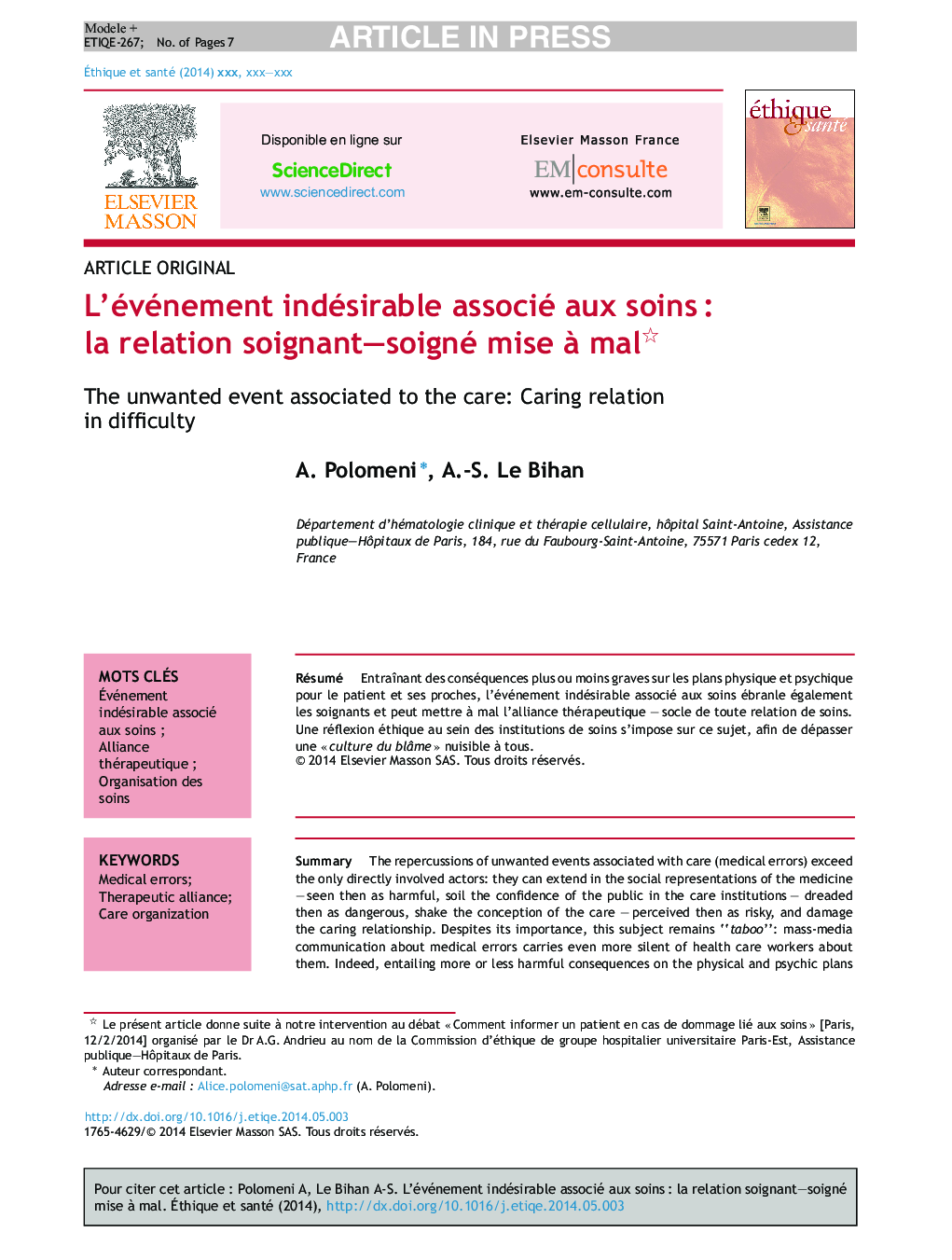| کد مقاله | کد نشریه | سال انتشار | مقاله انگلیسی | نسخه تمام متن |
|---|---|---|---|---|
| 1072019 | 949657 | 2014 | 7 صفحه PDF | دانلود رایگان |
عنوان انگلیسی مقاله ISI
L'événement indésirable associé aux soins : la relation soignant-soigné mise à mal
دانلود مقاله + سفارش ترجمه
دانلود مقاله ISI انگلیسی
رایگان برای ایرانیان
کلمات کلیدی
موضوعات مرتبط
علوم پزشکی و سلامت
پزشکی و دندانپزشکی
سیاست های بهداشت و سلامت عمومی
پیش نمایش صفحه اول مقاله

چکیده انگلیسی
The repercussions of unwanted events associated with care (medical errors) exceed the only directly involved actors: they can extend in the social representations of the medicine - seen then as harmful, soil the confidence of the public in the care institutions - dreaded then as dangerous, shake the conception of the care - perceived then as risky, and damage the caring relationship. Despites its importance, this subject remains “taboo”: mass-media communication about medical errors carries even more silent of health care workers about them. Indeed, entailing more or less harmful consequences on the physical and psychic plans for the patient and his close relations, medical errors also destabilise care teams and can damage the therapeutic alliance - base of the care relationship. Care relationships depends on the way in which health care can respond to patients and close relatives' demands, even if their expectations can seem “unreasonable” from the medical point of view. These expectations are composed by the willing of cure, the conviction of doing the best for getting recovered and by the confidence in the competence of health care teams. The quality of the interactions between patients, their close relatives with health care teams will influence their experience of the disease and can help the construction of a cooperative relationship. The information about the disease and its treatment, including risks and uncertainties concerning recovery, is a crucial issue for the quality of patients' care. Sharing with patients' medical uncertainties can allow them to better understand problems that may occur during their care pathway and may be helpful in the cases of medical errors. Even if this information process is well conduct, to patients, their siblings and also to health teams, medical errors are experienced as “unconceivable”. Actually, they point out individual and collective failures: their causes are always “systemic” and linked to workload, insufficient. It is important to underline that besides workload, another factors impact on health care's security and quality - notably management modalities that discourage personal involvement and participation in work organisation. Protocols and procedures are not sufficient means to assure the quality of care: the commitment of each health care work is essential in preventing unwanted events associated to care. When medical errors occur, health care workers tend to feel guilty and their suffering is to be taken into account. It is necessary to analyse the chain of problems that lead to medical error and to understand its institutional and collective dimensions in order to avoid this felling of “fault” and the tendency of eluding the unwanted event associated with care. Yet, in these situations, to take care is firstly to announce the damage: clarify what passed, the causes of the event, its consequences for the patient and the acts undertaken to check them, decrease them, and repair them. In fact, to inform the patient about a medical error is at the same time a legal obligation and an ethical commitment. But it is mainly a caring act that has a therapeutic effect: by recognizing the damage, this disclosure recognizes the subject, which underwent the medical error. Disclosing a medical error is a challenge for health care workers. An ethical reflection within the institutions of care is imperative on this subject, to overtake a “culture of the disapproval” harmful to all.
ناشر
Database: Elsevier - ScienceDirect (ساینس دایرکت)
Journal: Ãthique & Santé - Volume 11, Issue 4, December 2014, Pages 209-215
Journal: Ãthique & Santé - Volume 11, Issue 4, December 2014, Pages 209-215
نویسندگان
A. Polomeni, A.-S. Le Bihan,